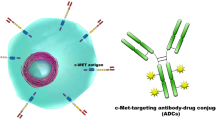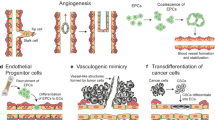Abstract
Since angiogenesis plays a key role in tumor growth, progression and metastasization, anti-vascular endothelial growth factor (VEGF)/VEGF receptor (VEGFR) agents have been developed over the years as anticancer agents, and have changed, for the better, the natural history of a number of cancer types. In the present review, the renal safety profile of presently available agents targeting either VEGF or VEGFRs will be discussed, together with the peculiarities related to their clinical use in patients with impaired renal function, or even in dialysis. Indeed, renal toxicity (especially, but not exclusively, hypertension and proteinuria) are quite commonly observed with these agents, and may be increased by the concomitant use of cytoxic chemotherapeutics. Despite all the above, kidney impairment or dialysis must not be regarded di per se as reasons not to administer or to stop an active anticancer treatment, especially considering the possibility of a significant survival improvement in many cancer patients treated with these agents.

Similar content being viewed by others
References
Folkman J (1971) Tumor angiogenesis: therapeutic implications. N Engl J Med 285:1182–1186
Neufeld G, Cohen T, Gengrinovitch S et al (1999) Vascular endothelial growth factor (VEGF) and its receptors. FASEB J 13:9–22
McMahon G (2000) VEGF receptor signaling in tumor angiogenesis. Oncologist 5(Suppl. 1):3–10
Ferrara N, Alitalo K (1999) Clinical applications of angiogenic growth factors and their inhibitors. Nat Med 5:1359–1364
Doi K, Noiri E, Fujita T (2010) Role of vascular endothelial growth factor in kidney disease. Curr Vasc Pharmacol 8:122–128
Schrijvers BF, Flyvbjerg A, De Vriese AS (2004) The role of vascular endothelial growth factor (VEGF) in renal pathophysiology. Kidney Int 65:2003-17. Nat Rev Drug Discov 3:391–400
Giantonio BJ, Catalano PJ, Meropol NJ et al (2007) Bevacizumab in combination with oxaliplatin, fluorouracil, and leucovorin (FOLFOX4) for previously treated metastatic colorectal cancer: results from the Eastern Cooperative Oncology Group Study E3200. J Clin Oncol 25:1539–1544
Sandler A, Gray R, Perry MC et al (2006) Paclitaxel-carboplatin alone or with bevacizumab for non-small-cell lung cancer. N Engl J Med 355:2542–2550
Croom KF, Dhillon S (2011) Bevacizumab: a review of its use in combination with paclitaxel or capecitabine as first-line therapy for HER2-negative metastatic breast cancer. Drugs 71:2213–2229
Tanne JH (2011) FDA cancels approval for bevacizumab in advanced breast cancer. BMJ 343:d7684
Escudier B, Pluzanska A, Koralewski P et al (2007) Bevacizumab plus interferon alfa-2a for treatment of metastatic renal cell carcinoma: a randomised, double-blind phase III trial. Lancet 370:2103–2111
Eskander RN, Tewari KS (2014) Incorporation of anti-angiogenesis therapy in the management of advanced ovarian carcinoma—mechanistics, review of phase III randomized clinical trials, and regulatory implications. Gynecol Oncol 132:496–505
Specenier P (2012) Bevacizumab in glioblastoma multiforme. Expert Rev Anticancer Ther 12:9–18
Van Cutsem E, Tabernero J, Lakomy R et al (2012) Addition of aflibercept to fluorouracil, leucovorin and irinotecan improves survival in a phase III randomized trial in patients with metastatic colorectal cancer previously treated with an oxaliplatin-based regimen. J Clin Oncol 30:3499–3506
Fuchs CS, Tomasek J, Yong CJ et al (2014) Ramucirumab monotherapy for previously treated advanced gastric or gastro-oesophageal junction adenocarcinoma (REGARD): an international, randomised, multicentre, placebo-controlled, phase 3 trial. Lancet 383:31–39
Wilke H, Muro K, Van Cutsem E et al (2014) Ramucirumab plus paclitaxel versus placebo plus paclitaxel in patients with previously treated advanced gastric or gastro-oesophageal junction adenocarcinoma (RAINBOW): a double-blind, randomised phase 3 trial. Lancet Oncol 15:1224–1235
Garon EB, Ciuleanu TE, Arrieta O et al (2014) Ramucirumab plus docetaxel versus placebo plus docetaxel for second-line treatment of stage IV non-small-cell lung cancer after disease progression on platinum-based therapy (REVEL): a multicentre, double-blind, randomised phase 3 trial. Lancet 384:665–673
Tabernero J, Yoshino T, Cohn AL et al (2015) Ramucirumab versus placebo in combination with second-line FOLFIRI in patients with metastatic colorectal carcinoma that progressed during or after first-line therapy with bevacizumab, oxaliplatin, and a fluoropyrimidine (RAISE): a randomised, double-blind, multicentre, phase 3 study. Lancet Oncol 16:499–508
Motzer RJ, Hutson TE, Tomczak P et al (2007) Sunitinib versus interferon alfa in metastatic renal-cell carcinoma. N Engl J Med 356:115–124
Demetri GD, van Oosterom AT, Garrett CR et al (2006) Efficacy and safety of sunitinib in patients with advanced gastrointestinal stromal tumour after failure of imatinib: a randomised controlled trial. Lancet 368:1329–1338
Raymond E, Dahan L, Raoul JL et al (2011) Sunitinib malate for the treatment of pancreatic neuroendocrine tumors. N Engl J Med 364:501–513
Sternberg CN, Davis ID, Mardiak J et al (2010) Pazopanib in locally advanced or metastatic renal cell carcinoma: results of a randomized phase III trial. J Clin Oncol 28:1061–1068
van der Graaf WT, Blay JY, Chawla SP et al (2012) Pazopanib for metastatic soft-tissue sarcoma (PALETTE): a randomised, double-blind, placebo-controlled phase 3 trial. Lancet 379:1879–1886
Rini BI, Escudier B, Tomczak P et al (2011) Comparative effectiveness of axitinib versus sorafenib in advanced renal cell carcinoma (AXIS): a randomised phase 3 trial. Lancet 378:1931–1939
Margolin K, Gordon MS, Holmgren E et al (2001) Phase Ib trial of intravenous recombinant humanized monoclonal antibody to vascular endothelial growth factor in combination with chemotherapy in patients with advanced cancer: pharmacologic and long-term safety data. J Clin Oncol 19:851–856
Porta C, Cosmai L, Gallieni M, Pedrazzoli P, Malberti F (2015) Renal effects of targeted anticancer therapies. Nat Rev Nephrol 11:354–370
Izzedine H, Rixe O, Billemont B, Baumelou A, Deray G (2007) Angiogenesis inhibitor therapies: focus on kidney toxicity and hypertension. Am J Kidney Dis 50:203–218
Syrigos KN, Karapanagiotou E, Boura P, Manegold C, Harrington K (2011) Bevacizumab-induced hypertension. Pathogenesis and management. Biodrugs 25:159–169
Stylianou K, Lioudaki E, Papadimitraki E et al (2011) Crescentic glomerulonephritis associated with vascular endothelial growth factor (VEGF) inhibitor and bisphosphonate administration. Nephrol Dial Transplant 26:1742–1745
George BA, Zhou XJ, Toto R (2007) Nephrotic syndrome after Bevacizumab: case report and literature review. Am J Kidney Dis 49:e23–e29
Eremina V, Jefferson JA, Kowalewska J et al (2008) VEGF inhibition and renal thrombotic microangiopathy. N Engl J Med 358:1129–1136
Sugimoto H, Hamano Y, Charytan D et al (2003) Neutralization of circulating vascular endothelial growth factor (VEGF) by anti-VEGF antibodies and soluble VEGF receptor 1 (sFlt-1) induces proteinuria. J Biol Chem 278:12605–12608
Miller KD, Chap LI, Holmes FA et al (2005) Randomized phase III trial of capecitabine compared with bevacizumab plus capecitabine in patients with previously treated metastatic breast cancer. J Clin Oncol 23:792–799
Zachary I (2001) Signaling mechanism mediating vascular protective actions of vascular endothelial growth factor. Am J Physiol 280:c1375–c1386
Mourad JJ, des Guetz G, Debbabi H, Levy BI (2008) Blood pressure rise following angiogenesis inhibition by bevacizumab. A crucial role for microcirculation. Ann Oncol 19:927–934
Yao SK, Ober JC, Krishnaswami A et al (1992) Endogenous nitric oxide protects against platelet aggregation and cyclic flow variations in stenosed and endothelium-injured arteries. Circulation 86:1302–1309
Hicklin DJ, Ellis LM (2005) Role of the vascular endothelial growth factor pathway in tumor growth and angiogenesis. J Clin Oncol 23:1011–1027
Mancia G, De Backer G, Dominiczak A et al (2007) 2007 ESH-ESC Practice guidelines for the management of arterial hypertension: ESH-ESC Task Force on the management of arterial hypertension. J Hypertens 25:1751–1762
Izzedine H, Ederhy S, Goldwasser F et al (2009) Management of hypertension in angiogenesis inhibitor-treated patients. Ann Oncol 20:807–815
BC Cancer Agency. BC Cancer agency management guidelines. Management guidelines of bevacizumab-related side effects. http://www.bccancer.bc.ca/NR/rdonlyres/6D39414F-EC1A4BE-9ACB-6DE017C9B4C4/19258/managementforbevacizumabsideeffects_1Dec06.pdf. Accessed 22 June 2014
Porta C, Paglino C, Imarisio I, Bonomi L (2007) Uncovering Pandora’s vase: the growing problem of new toxicities from novel anticancer agents: the case of sorafenib and sunitinib. Clin Exp Med 7:127–134
Izzedine H, Perazzella MA (2015) Thrombotic microangiopathies, cancer and cancer drugs. Am J Kidney Dis 66:857–868
Blake-Haskins JA, Lechleider RJ, Kreitman R (2011) Thrombotic microangiopathy with targeted cancer agents. Clin Cancer Res 17:5858–5866
Porta C, Danova M, Riccardi A, Bobbio-Pallavicini E, Ascari E (1999) Cancer chemotherapy-related thrombotic thrombocytopenic purpura: biological evidence of increased nitric oxide production. Mayo Clin Proc 74:570–574
Feldman DR, Baum MS, Ginsberg MS et al (2009) Phase I trial of bevacizumab plus escalated doses of sunitinib in patients with metastatic renal cell carcinoma. J Clin Oncol 27:1432–1439
Zhu X, Wu S, Dahut WL, Parikh CR (2007) Risks of proteinuria and hypertension with Bevacizumab, an antibody against vascular endothelial growth factor: sistematic review and meta-analysis. Am J Kidney Dis 49:186–193
Wu S, Kim C, Baer L, Zhu X (2010) Bevacizumab increases risk for severe proteinuria in cancer patients. J Am Soc Nephrol 21:1381–1389
Zhang ZF, Wang T, Liu LH, Guo HQ (2014) Risks of proteinuria associated with vascular endothelial growth factor receptor tyrosine kinase inhibitors in cancer patients: a systematic review and meta-analysis. PLoS ONE 9:e90135
Abdel-Rahman O, El Halawani H (2014) Proteinuria in patients with solid tumors treated with ramucirumab: a systematic review and meta-analysis. Chemotherapy 60:325–333
Ranpura V, Pulipati B, Chu D, Zhu X, Wu S (2010) Increased risk of high-grade hypertension with bevacizumab in cancer patients: a meta-analysis. Am J Hypert 23:460–468
Qi WX, Shen Z, Tang LN, Yao Y (2014) Risk of hypertension in cancer patients treated with aflibercept: a systematic review and meta-analysis. Clin Drug Investig 34:231–240
Wang J, Wang Z, Zhao Y (2015) Incidence and risk of hypertension with ramucirumab in cancer patients: a meta-analysis of published studies. Clin Drug Investig 35:221–228
Zhu X, Stergiopoulos K, Wu S (2009) Risk of hypertension and renal dysfunction with an angiogenesis inhibitor sunitinib: systematic review and meta-analysis. Acta Oncol 48:9–17
Qi WX (2013) Incidence and risk of hypertension with pazopanib in patients with cancer: a meta-analysis. Cancer Chemother Pharmacol 71:431–439
Qi WX, He AN, Shen Z, Yao Y (2013) Incidence and risk of hypertension with a novel multi-targeted kinase inhibitor axitinib in cancer patients: a systematic review and meta-analysis. Br J Clin Pharmacol 76:348–357
Macfarlane R, Heng DY, Xie W et al (2012) The impact of kidney function on the outcome of metastatic renal cell carcinoma patients treated with vascular endothelial growth factor-targeted therapy. Cancer 118:365–370
Khosravan R, Toh M, Garrett M et al (2009) Pharmacokinetics and safety of sunitinib malate in subjects with impaired renal function. J Clin Pharmacol 50:472–481
Gupta S, Parsa V, Heilbrun LK et al (2011) Safety and efficacy of targeted agents in metastatic kidney cancer patients with renal dysfunction. Anticancer Drugs 22:794–800
Méndez-Vidal MJ, Martínez Ortega E, Montesa Pino A, Pérez Valderrama B, Viciana R (2012) Management of adverse events of targeted therapies in normal and special patients with metastatic renal cell carcinoma. Cancer Metastasis Rev 31(Suppl 1):S19–S27
Garnier-Viougeat N, Rixe O, Paintaud G et al (2007) Pharmacokinetics of bevacizumab in haemodialysis. Nephrol Dial Transplant 22:975
Inauen R, Cathomas R, Boehm T et al (2007) Feasibility of using cetuximab and bevacizumab in a patient with colorectal cancer and terminal renal failure. Oncology 72:209–210
Masini C, Sabbatini R, Porta C et al (2012) Use of tyrosine kinase inhibitors in patients with metastatic kidney cancer receiving haemodialysis: a retrospective Italian survey. BJU Int 110:692–698
Josephs D, Hutson TE, Cowey CL et al (2011) Efficacy and toxicity of sunitinib in patients with metastatic renal cell carcinoma with severe renal impairment or on haemodialysis. BJU Int 108:1279–1283
Izzedine H, Etienne-Grimaldi MC, Renée N, Vignot S, Milano G (2009) Pharmacokinetics of sunitinib in hemodialysis. Ann Oncol 20:190–192
Porta C, Levy A, Hawkins R et al (2014) Impact of adverse events, treatment modifications, and dose intensity on survival among patients with advanced renal cell carcinoma treated with first-line sunitinib: a medical chart review across ten centers in five European countries. Cancer Med 3:1517–1526
Cosmai L, Porta C, Gallieni M, Perazella MA (2016) Onco-nephrology: a decalogue. Nephrol Dial Transplant 31(4):515–519
Author information
Authors and Affiliations
Corresponding author
Ethics declarations
Conflict of interest
Disclosure of potential conflicts of interest: LC, nothing to disclose; MG, nothing to disclose; WL, nothing to disclose; CP, nothing to disclose.
Ethical approval
This article does not contain any studies with human participants or animals performed by any of the authors.
Rights and permissions
About this article
Cite this article
Cosmai, L., Gallieni, M., Liguigli, W. et al. Renal toxicity of anticancer agents targeting vascular endothelial growth factor (VEGF) and its receptors (VEGFRs). J Nephrol 30, 171–180 (2017). https://doi.org/10.1007/s40620-016-0311-8
Received:
Accepted:
Published:
Issue Date:
DOI: https://doi.org/10.1007/s40620-016-0311-8




